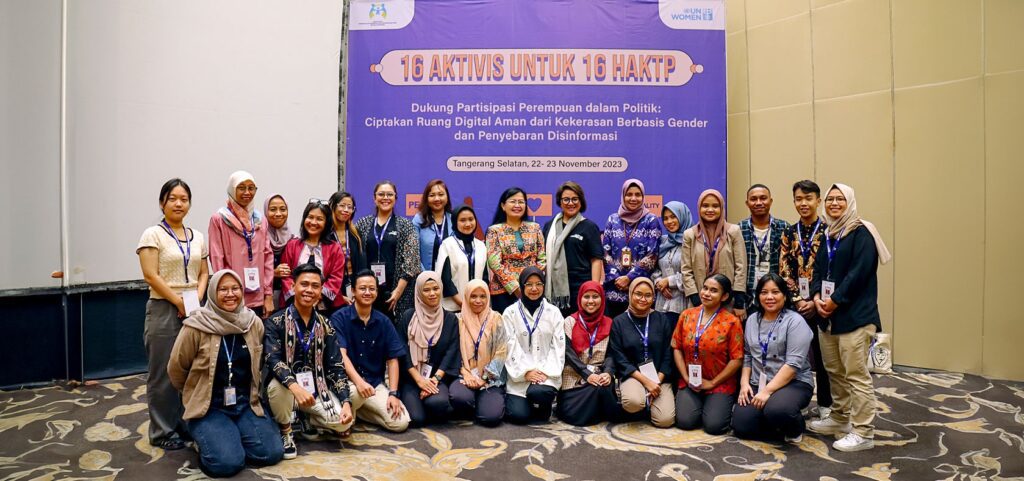Indonesian youths trained on how to respond to online gender-based violence against women in politics
By Inggita Notosusanto
On May 1, 2024

Jakarta Indonesia — UN Women Indonesia marked the annual United Nations 16 Days of Activism against Gender-based Violence campaign 2023 by inviting young people to learn about how to combat violence perpetrated online.
Entitled “Combating Online Gender-based Violence, Misinformation, Disinformation, and Hoaxes to Support Women’s Leadership in Politics” the workshop was held in South Tangerang, Banten Province. The 16 participants — young digital activists from various provinces and backgrounds – learned about this form of violence, gender representation disparities, and online violence against women politicians, as well as the important role of young people in addressing these problems.
The largest group of potential voters in the recent elections were the 8 million aged 17-30; they make up more than 31 per cent of total voters. The young generation, especially Gen Z (those in their teens to early 20s) born in the digital age, can play a crucial role in preventing and combating online gender-based violence, misinformation, and fake news or hoaxes.
“This is a political year, and it is the first time that specific anti-online gender-based violence training involving violence against women in politics is being conducted,” said Eni Widiyanti, Deputy Assistant for the Protection of Women’s Rights in the Household and of Vulnerable Women, Ministry of Women’s Empowerment and Child Protection.
Dwi Faiz, Head of Programmes at UN Women Indonesia, said that in line with the 16 Days of Activism campaign, UN Women worked with the Ministry to highlight “this important yet almost invisible gender issue: violence against women in politics.”
About the workshop, Hosianna Rugun Anggreni, Programme Analyst at UN Women Indonesia, said: “It is our goal to empower these young digital activists to promote women’s leadership and participation. With practical tools they learned from the sessions, they are able to address online gender-based violence, misinformation, disinformation, and hoaxes toward the election.”
Ni Luh Putu Elsy, a reproductive health worker who participated in the workshop, said: “Due to the lack of information about the role of women in politics and the threats of violence they face, we are not confident to bring up this topic in our community. I hope I can represent Southeast NTT (Nusa Tengarra Timur Province) to share what we learned here with the community platform we have built.”
Pretty Simunapendy, an activist from Jayapura, Papua Province, said, “After attending these sessions, I feel empowered to confidently step forward and speak up for women around me in Papua.”
Hastu Wijayasri, 26, an advocate for the rights of deaf people, said: “I am the only deaf participant who got the opportunity to discuss women’s participation in politics, online gender-based violence, and misinformation, and even learning about creative content strategies to reach audiences. As a content creator and deaf activist, I gained a lot of insights on how to address women’s issues.”
The workshop concluded with a competition in which the participants used the skills they learned to create content about online gender-based violence, misinformation and women politicians. They uploaded the content on social media.
This piece was republished from Asia Pacific.